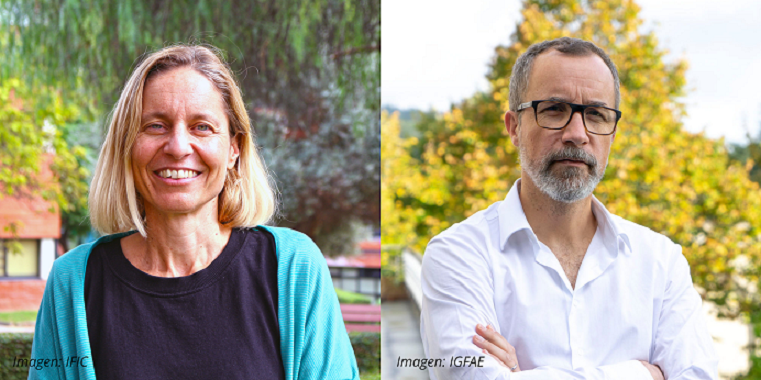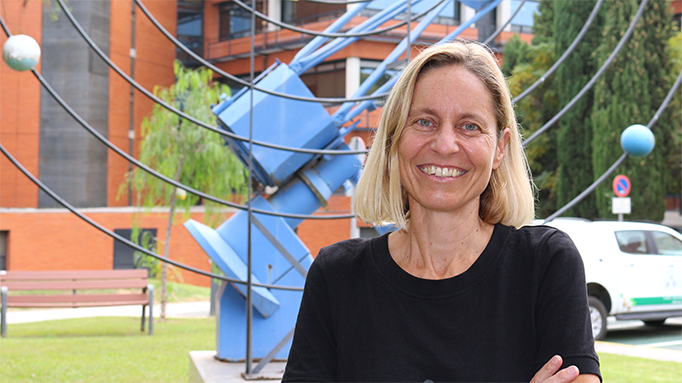The CSIC researcher at the Corpuscular Physics Institute (IFIC), María José Costa, will take over the direction of the National Center for Particle, Astroparticle and Nuclear Physics (CPAN) together with Carlos A. Salgado, director of the Galician Institute of High Energy Physics (IGFAE) and professor at the University of Santiago de Compostela (USC), who will occupy the position of vice-director
On January 24, the CPAN's Scientific Strategy Council (CEC) approved the new management team at the head of the institution. This project arose in 2007, within the framework of the Consolider-Ingenio 2010 program, with the aim of actively promoting cooperation between Spanish research groups with expertise in particle, astroparticle and nuclear physics.
María José Costa Mezquita, CSIC researcher at the Institute of Corpuscular Physics (IFIC, CSIC-UV), belonging to the scientific-academic area of the UV Science Park, will take over the direction of the CPAN, thus relieving Antonio Pich Zardoya, professor at the University of Valencia (UV) and researcher at IFIC, who has been leading the project for the last 16 years.
Carlos Alberto Salgado López, professor at the University of Santiago de Compostela (USC) and director of the Galician Institute of High Energy Physics (IGFAE, Xunta de Galicia-USC), will be the new deputy director of CPAN, taking over from Marcos Cerrada Canales, researcher and former director of the Basic Research Department of the Center for Energy, Environmental and Technological Research (CIEMAT).
"The structuring of the Spanish community at CPAN has played a key role in ensuring that Spain has played an important role in the most cutting-edge and competitive international experiments in the field, including important theoretical contributions", explains Costa, the new director of CPAN. She adds: "The previous CPAN management team strongly promoted this project, keeping it fully active throughout these 16 years, even in the most difficult moments of funding for Spanish science. It is a great honor for us to take over now, and we will work to keep CPAN as a reference."
Finally, and as every year, half of the representatives of the four thematic areas of the CPAN have also been renewed, who together with the director, deputy director and manager, complete the Executive Committee of the CPAN.
"The structuring of the Spanish community in the CPAN has played a key role so that Spain has had a relevant weight in the most cutting-edge and competitive international experiments in the field, including important theoretical contributions", María José Costa, new director of the CPAN

María José Costa y Carlos A. Salgado, new CPAN board members. Photo: IFIC and IGFAE
Scientific trajectory of María José Costa, new director of CPAN
María José Costa Mezquita (València, 1974) is a CSIC research scientist at the Institute of Corpuscular Physics, a center of which she was deputy director during 2015-2019. She is coordinator of the CSIC strategic theme Understanding the basic components of the Universe, its structure and evolution. For the last two years, she has been a member of the CPAN Executive Committee, representing the area of Experimental Particle Physics.
His field of research is experimental particle physics at high energy colliders. In this field, she has participated in the two large accelerators at CERN: the Large Electron-Positron Collider (LEP) and its successor, the Large Hadron Collider (LHC). For 25 years he has been working at ATLAS, one of the two large experiments at the LHC. In the last four years she has co-directed IFIC's ATLAS project dedicated to the operation and analysis of the experiment's data, with emphasis on the physics of the Higgs boson, fundamental for understanding the origin of the mass of elementary particles, and of the top quark, the most massive elementary particle.
Costa has also recently been appointed as the new chair of the ATLAS Council. Her election as chair of the ATLAS Collaboration means a four-year term that has already started this January as deputy chair, to become chair for two years, in 2024 and 2025, and return to the vice-chair in 2026. During this period, Costa will lead an international collaboration of more than 5,500 scientists, engineers and technicians from 181 institutions in 42 countries.
"It is a great honor for us to take over, and we will work to ensure that CPAN continues to be a benchmark"


